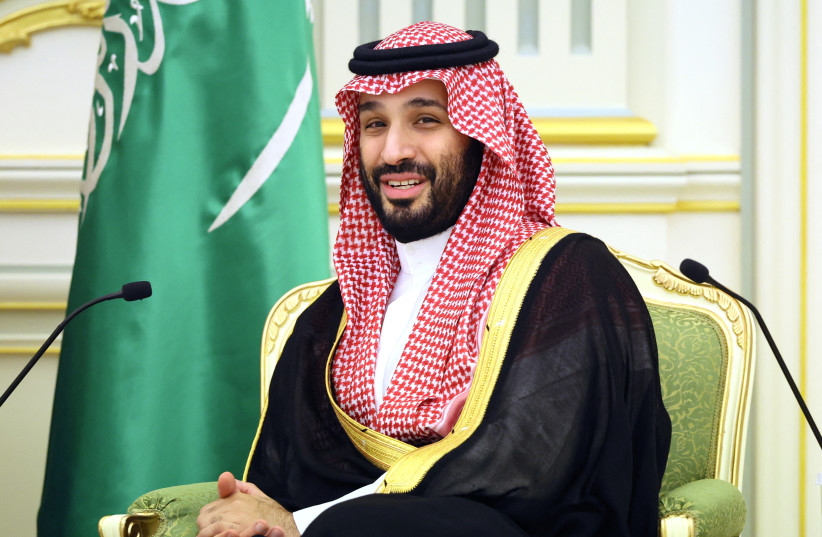In its response to Iran, Israel must weigh new regional cooperation
Iran’s massive drone and missile attack on Israel Sunday morning is a seminal event that thrust the Middle East into a new era.
For the first time in history, Iran launched an attack on Israel directly from its territory, employing drones and both cruise and ballistic missiles that have been under development for decades.
These weapons served as a crucial element of Iran’s strategic deterrence and enabled the projection of its power across the region. While Iran’s nuclear program is still evolving, its extensive missile and drone capabilities elevated it to a regional powerhouse not to be overlooked. Take away those capabilities, and Iran appears far less menacing.
The head-spinning success Israel and its allies had Sunday morning in swatting Iranian projectiles out of the sky has shown that Iran’s missile threat is not as dire and catastrophic as many thought. The ramifications of this will be felt for years in ways that may be hard to imagine today.
One way is that what happened Sunday morning might catalyze formal Israel-Saudi relations.

If indeed this is one of the unintended consequences of Iran’s attack, it will be a sweet irony, considering that one of the outcomes the ayatollahs were hoping for after Hamas’s October 7 attack was that a strong Israeli response would thwart an Israel-US-Saudi deal that was being earnestly discussed and promoted.
Though it now seems like eons ago, last September there was serious talk about a game-changing pact that would contain the following elements: The US would sign a NATO-like defense treaty with Israel and Saudi Arabia, sell state-of-the-art weaponry to the Saudis and assist in its development of a civilian nuclear program that would include the right to domestic uranium enrichment. The Saudis would normalize ties with Israel, help end the war in Yemen, and provide massive financial assistance to the Palestinians. And Israel would put a cap on settlement activity and pledge not to annex Judea and Samaria.
Soon after Biden met with Prime Minister Benjamin Netanyahu at the UN and discussed this plan, Saudi Crown Prince Mohammed bin Salman acknowledged in a stunning interview with Fox News that his country was moving “closer” each day to a normalization deal with Israel and that the process is “for the first time a real one, serious.”
A little over two weeks later, Hamas sent more than 3,000 terrorists across the border to murder, rape, kidnap, and pillage. Israel responded with justified ferocity, and all hopes of Saudi-Israeli normalization seemed shattered.
Yet they are not, and the quiet role the Saudis played in helping Israel and the US thwart Iran’s missile attack is proof of that.
According to a report Monday in The Wall Street Journal, Saudi Arabia was one of the countries in the region that quietly agreed to share intelligence with the US about an impending Iranian attack.
According to the report, Iranian officials briefed officials from Saudi Arabia and other Gulf countries on the outline of their attack two days before, allowing them to safeguard their airspace.
As part of a regional air-defense system the US has painstakingly created over the last few years, this information was shared with the US, giving Washington and Jerusalem crucial advanced warning, though the Saudis did not give the US and Israel use of their airspace to intercept the missiles and drones. Jordan did grant that permission and even participated in downing some of the drones.
Such security cooperation with the Saudis – albeit not complete – would have been unimaginable a decade ago and is something that needs to be built upon to re-energize talk of a three-way Israel-Saudi-US deal once the Gaza war ends.
The two pillars on which Israel’s security stands
In the post-April 14 Middle East, Israel’s security will be based on two pillars. The primary pillar is its might and deterrence, which necessitates a robust response to Iran’s brazen attack.
The second pillar is a regional defense architecture that is still a work in progress but whose benefits were already evident in Sunday’s early hours.
To ensure the success of this regional architecture, Israel must now carefully weigh its response to Iran, ensuring that it does not undermine this regional cooperation, which, in the darkness currently enveloping the Middle East, is one flicker of hopeful light.





Comments are closed.